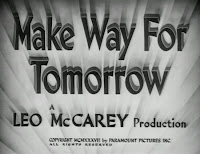
This has been rumored for a while, but a Criterion representative has confirmed that the company has licensed Leo McCarey's Make Way For Tomorrow and they'll be releasing it on DVD, though they don't have a release date set yet.
You know how I was saying that directors' serious dream projects almost always turn out to be disappointing? Well, Make Way For Tomorrow kind of proves me wrong. That is a classic "Oh, Brother, Where Art Thou?" project. McCarey was one of the world's best directors of light comedy, with masterpieces like Duck Soup and Ruggles of Red Gap (where is that on DVD?) to his credit. He fought Paramount to get the go-ahead for a downbeat drama with no stars that would highlight a social problem (the treatment of the elderly). When he won the Oscar for directing his other movie of 1937, the equally great light comedy The Awful Truth,, he said that the Academy had given him the award for the wrong picture. He was a John L. Sullivan and this was his "Oh, Brother, Where Art Thou?" -- but it was every bit as great as he believed it was. I know that Tokyo Story, which it influenced, is the more famous movie, but this one hits me much harder, and I think it's the greater film.
What sets it apart is that instead of toning down his usual style the way directors usually do when they approach serious subjects (Spielberg, for example, or Lubitsch when he made the unbearable The Man I Killed), McCarey ws completely himself in the making of Make Way For Tomorrow. The improvisation, broad sense of humor and sentimentality are all there as usual, they're just applied to a story that can't have a happy ending.
And it always puts story and character before the message, something that can't be said, for, say, In Cold Blood (I just bring it up because I saw it on TCM yesterday, and was reminded again that it's one of the last of the well-made, well-meaning, slightly dead Hollywood movie that wants to teach us Important Lessons). The ending is heartbreaking because we've grown to know these two people as people, which includes showing their flaws.
Usually when a Hollywood director wants to make a downbeat movie on a very serious subject, he puts the subject before anything else; it's like those guys in The Player whose entire concept for a "serious" movie is based on the proposition that there should be no stars and an unhappy ending that shows the evils of capital punishment. (It's part of my backlash against The Player that I'm now convinced that the movie the studio finally ends up making -- where Bruce Willis saves Julia Roberts from being executed -- would be much better than what was originally pitched.) In Mark Harris's book "Pictures at a Revolution," about the movies of 1967, he quotes Stanley Kramer as saying that Sidney Poitier's character in Guess Who's Coming To Dinner had to be inhumanly perfect, otherwise the message of the movie would not have worked, because there would have been some legitimate excuse for the parents to be against him. McCarey doesn't work that way; he makes the Victor Moore character a man who's tough to live with and put up with, who shouts insults at and eventually bites his doctor. McCarey gives the children legitimate reasons for not wanting to take both of their parents in. And the movie's emotional impact is greater because there was no easy way out for anybody.
